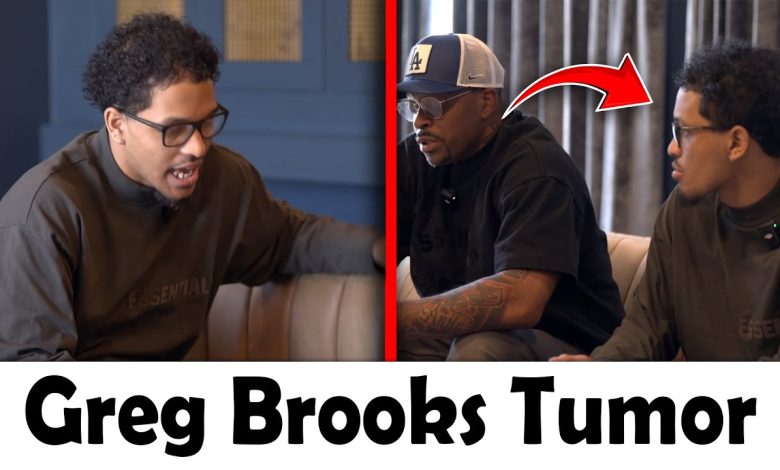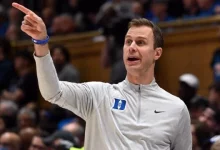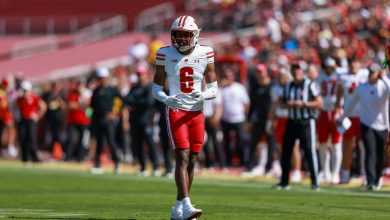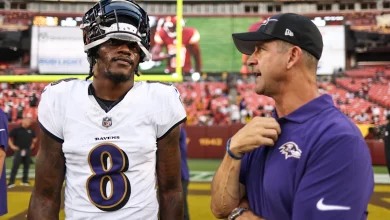Ryan Clark and LSU’s Greg Brooks Jr. share emotional conversation about resilience, recovery, and life after a devastating brain tumor.

In a world where athletes often embody strength, resilience, and invincibility, the story of Greg Brooks Jr. reminds us that even the toughest among us can face battles beyond the field of play. For Brooks, a former captain of LSU’s football team, life took an unexpected turn when he was diagnosed with a brain tumor—an event that shook not only him but also his family, teammates, and the entire sports community.
Ryan Clark, a former NFL player, who has made a name for himself as a sports analyst, and someone who is no stranger to adversity, sat down for an emotional conversation with Brooks. The discussion highlighted more than just the struggle with a life-threatening illness; it was a conversation about perspective, resilience, and the bonds formed in times of hardship.
The Beginning of the Journey
Greg Brooks Jr.’s journey to discovering the brain tumor began like any other college athlete’s—filled with hopes, dreams, and the desire to excel. Brooks, known for his leadership and his role as a defensive back for LSU, was at the top of his game when the unexpected happened. In the midst of an already successful football career, he began to experience unusual symptoms that would soon change the course of his life forever.
His symptoms started subtly—headaches, dizziness, and vision problems—but like many athletes, he initially pushed through, chalking it up to fatigue or the physical demands of the game. But when the symptoms didn’t subside, Brooks knew something was wrong. After undergoing tests, the shocking diagnosis came: a brain tumor. It was a devastating blow to the young athlete, someone who had built his identity and future around his athleticism and leadership on the football field.
The news was not just a personal crisis for Brooks; it was a blow to LSU and to the many who had followed his journey. His leadership as a captain had made him a symbol of perseverance and toughness, someone who had earned the respect of his peers and coaches. The diagnosis threatened to take away everything that he had worked so hard for.
The Power of Resilience
Ryan Clark, who has built a reputation not just for his football career but for his insightful commentary and advocacy on mental health and personal struggles, empathized deeply with Brooks. Clark’s own life had been shaped by overcoming personal adversities, including his own health battles during his time as an NFL player. Clark’s career was marred by a serious condition, sickle cell anemia, which led to him retiring earlier than he would have liked. That shared experience of health challenges created a bond between the two men that went beyond the sports world.
In their conversation, Clark talked openly about how moments of crisis reveal character and how resilience is tested not on the playing field, but in real life situations like health battles. For Brooks, the diagnosis was a test of not only his physical strength but his mental fortitude. He was forced to confront his own mortality at a young age, a stark contrast to the often-glamorous life of a football star. As Clark shared in the interview, “Resilience isn’t just about bouncing back from tough moments—it’s about finding strength when you don’t think you have any left. That’s the kind of test Greg’s going through now.”
Navigating the Physical and Mental Toll
Brooks described how his diagnosis affected him both physically and emotionally. The reality of being unable to do what he loved—playing football—was initially crushing. For an athlete, the loss of one’s body, the very thing that has defined their identity and career, can feel like losing a part of themselves. But, as he continued his recovery, Brooks realized that it wasn’t just his body that needed healing; his mind and spirit had to heal as well.
Clark, who has been vocal about his own struggles with mental health, underscored the importance of mental well-being in the recovery process. He explained how physical health is often emphasized in sports, but mental health is just as critical. “You can’t underestimate the mental battle that comes with a diagnosis like this,” Clark said. “You have to find a way to stay mentally strong when the situation seems hopeless, and that’s something I know Greg is learning to do now.”
For Brooks, the road to recovery has been long and arduous, filled with surgeries, treatments, and the constant fear of the unknown. But through it all, he found solace in his family, his faith, and the unwavering support from his LSU family. The bond he shared with his teammates and coaches had a profound impact on his recovery process. They didn’t just support him as a football player; they supported him as a person, a friend, and a son.
The Role of Faith and Family
One of the most powerful aspects of Brooks’ journey has been the unwavering support from his family. In their conversation, both Clark and Brooks spoke about the critical role faith and family played in helping him get through the darkest days of his illness. For Brooks, his family was a constant source of love and encouragement. His parents, his sisters, and his LSU family rallied around him, offering not just physical support but emotional and spiritual strength.
Clark, who has spoken often about the importance of faith in overcoming life’s challenges, echoed this sentiment. He spoke about how having a strong support system is vital when faced with adversity. “You can’t go through something like this alone,” Clark remarked. “That’s where your family and faith come in. They give you the strength to keep fighting, even when the fight feels too tough.”
For Brooks, faith became a central theme in his recovery. He relied on his belief in a higher power to help guide him through the uncertainty. There were moments during his treatment when he wasn’t sure if he would make it, but it was his faith that gave him the courage to keep moving forward. “I had days where I just wanted to give up, but it was my faith that kept me going,” Brooks shared during the conversation. “Knowing that there was something greater than me, that there was a purpose to everything, helped me push through the pain.”
A Changed Perspective on Life and Football
As Brooks continues his recovery, he finds that his perspective on life and football has changed in profound ways. The brain tumor diagnosis forced him to reevaluate his priorities and reassess what truly mattered to him. He spoke about how, after the diagnosis, his love for the game of football became more about passion and less about the accolades or recognition. Football, once his identity, became just one part of who he is.
For Clark, the conversation with Brooks was a reminder that sports can teach us many things, but the lessons learned off the field are often the most valuable. Clark mentioned how the adversity Brooks faced had not only made him stronger but had given him a new understanding of the fragility of life. “When you’re an athlete, you think you’re invincible,” Clark said. “But when life gives you a wake-up call like this, it changes everything. It forces you to see the bigger picture.”
For Brooks, the journey has been one of self-discovery. He now sees his role as a leader and a mentor not just in terms of football, but as someone who can inspire others going through their own battles. He wants to be the person who shows others that resilience isn’t just about surviving—it’s about thriving, even in the face of life’s greatest challenges.
The Road Ahead: A Message of Hope
As the conversation came to an end, both Clark and Brooks reflected on the road ahead. Brooks knows that his journey is far from over, and there will be challenges along the way. But, with the support of his family, his faith, and his inner strength, he feels ready to take on whatever comes next.
Ryan Clark, who has experienced his own trials and tribulations, offered a message of hope: “You can’t control the obstacles life throws at you, but you can control how you respond. Greg is showing us all how to respond with grace, strength, and a heart full of hope.”
For Greg Brooks Jr., the future is uncertain, but one thing is clear—he’s no longer defined by just his athletic ability. He’s defined by his resilience, his character, and his ability to inspire others. His story is a testament to the power of perseverance, the strength of the human spirit, and the importance of never giving up, no matter the challenge.
In the end, it’s not just about beating a brain tumor. It’s about winning in life, and Greg Brooks Jr. is doing just that.









